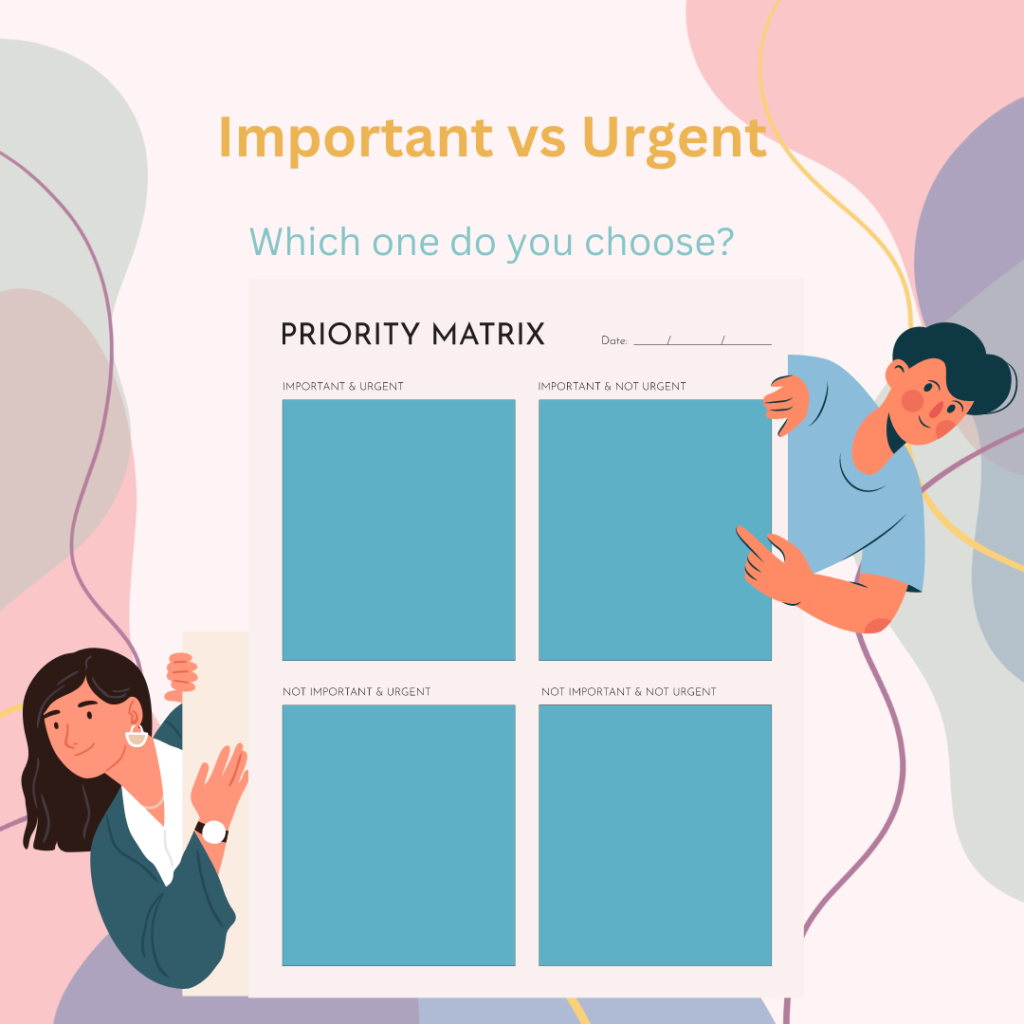Understanding the distinction between urgent and important tasks is crucial for effective time management and achieving life goals. Here’s a breakdown of why we do these tasks and the potential results:
Urgent Tasks
Definition:
Urgent tasks require immediate attention. They are typically associated with pressing deadlines and demand prompt action.
Why We Do Them:
- Deadlines: These tasks are often tied to specific deadlines that, if missed, could lead to immediate negative consequences.
- External Pressure: Urgent tasks are frequently driven by external demands, such as work assignments, crises, or requests from others.
- Immediate Impact: Completing urgent tasks can provide immediate relief from stress or pressure, as they often have a clear and immediate impact.
Results:
- Short-term Relief: Successfully addressing urgent tasks can reduce immediate stress and prevent crises.
- Reactionary Mode: Focusing primarily on urgent tasks can lead to a reactionary lifestyle, where long-term goals and important tasks are neglected.
- Burnout: Constantly dealing with urgent issues can lead to burnout due to the relentless pace and pressure.
Important Tasks
Definition:
Important tasks contribute to long-term goals, values, and overall well-being. They might not have immediate deadlines but are crucial for personal and professional growth.
Why We Do Them:
- Long-term Goals: Important tasks are aligned with long-term objectives and aspirations.
- Personal Fulfillment: These tasks often provide a sense of accomplishment and satisfaction, as they are linked to personal values and growth.
- Preventative Measures: Focusing on important tasks can prevent future crises and reduce the number of urgent tasks over time.
Results:
- Long-term Success: Consistently working on important tasks leads to significant progress toward long-term goals and personal growth.
- Balanced Life: Balancing urgent and important tasks contributes to a more fulfilling and less stressful life.
- Proactive Approach: Prioritizing important tasks fosters a proactive rather than a reactive approach to life, leading to better planning and preparedness.
Balancing Urgent and Important Tasks
- Prioritization: Use tools like the Eisenhower Matrix to categorize tasks based on urgency and importance.
- Time Management: Allocate specific times for important tasks to ensure they are not overshadowed by urgent ones.
- Delegation: Where possible, delegate urgent tasks that are not important to free up time for more critical activities.
- Reflection: Regularly review your goals and adjust your priorities to ensure a balanced approach to managing tasks.
Eisenhower Matrix (Urgent-Important Matrix)
- Quadrant I: Urgent and Important (Crisis management, immediate deadlines)
- Quadrant II: Not Urgent but Important (Long-term planning, relationship building)
- Quadrant III: Urgent but Not Important (Interruptions, some meetings)
- Quadrant IV: Not Urgent and Not Important (Distractions, time-wasters)
Eisenhower Matrix for Personal Life
The Eisenhower Matrix categorizes tasks into four quadrants based on their urgency and importance:
Urgent and Important
Tasks that require immediate attention and have significant consequences if not completed.
Examples:
- Handling a family emergency
- Completing a work project with a tight deadline
- Paying overdue bills to avoid penalties
- Attending a critical medical appointment
Not Urgent but Important
Tasks that are crucial for long-term success and well-being but do not require immediate action.
Examples:
- Planning and setting long-term goals
- Exercising regularly to maintain health
- Building and maintaining relationships with family and friends
- Investing time in personal development, such as taking a course or reading a book
Urgent but Not Important
Tasks that require immediate attention but do not significantly impact long-term goals.
Examples:
- Answering non-essential phone calls or emails
- Attending a meeting that doesn’t contribute to your primary objectives
- Completing minor requests from others that interrupt your focus
- Addressing minor household issues that could be delegated or scheduled for later
Not Urgent and Not Important
Tasks that do not require immediate attention and have little to no impact on long-term goals.
Examples:
- Watching TV or scrolling through social media excessively
- Engaging in gossip or trivial conversations
- Shopping for non-essential items online
- Participating in leisure activities that do not contribute to relaxation or well-being (e.g., mindless browsing)
By understanding and implementing strategies to balance urgent and important tasks, individuals can achieve greater efficiency, reduce stress, and make meaningful progress toward their long-term goals.

